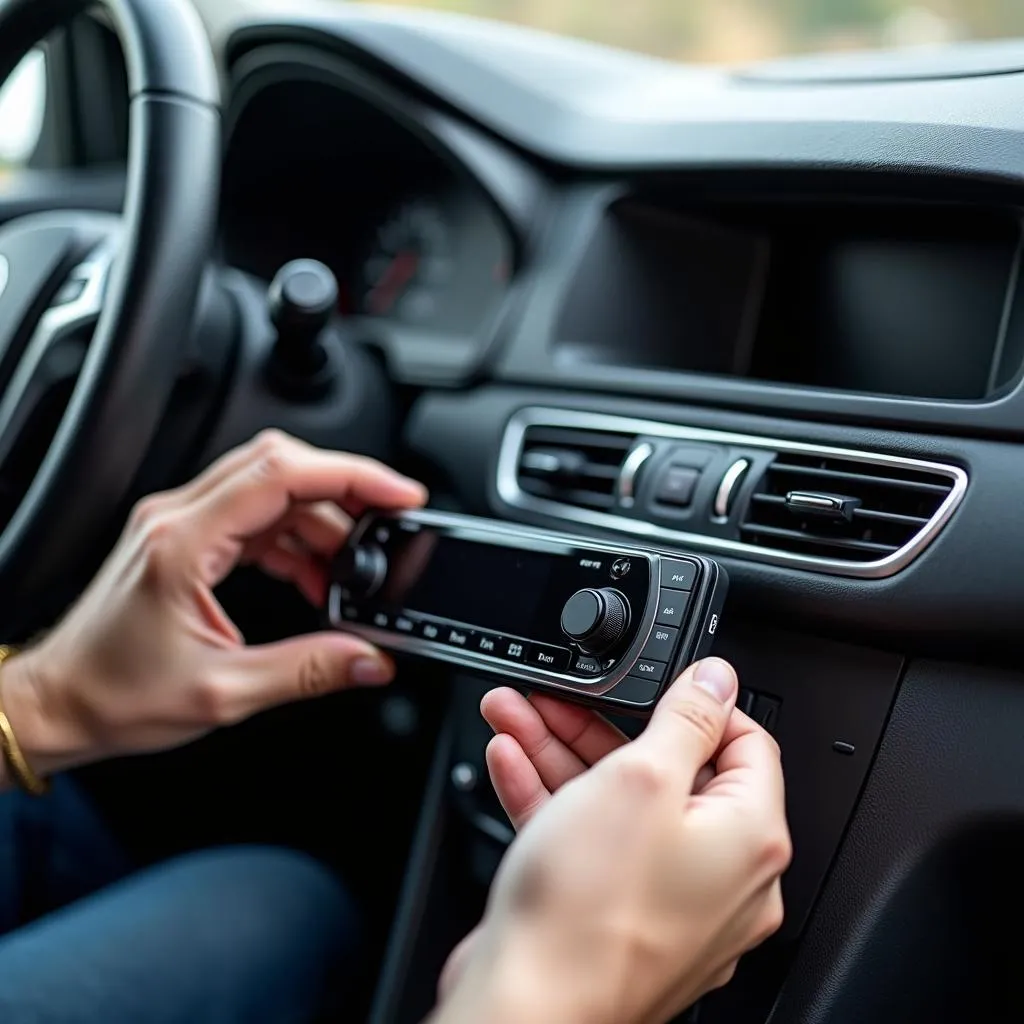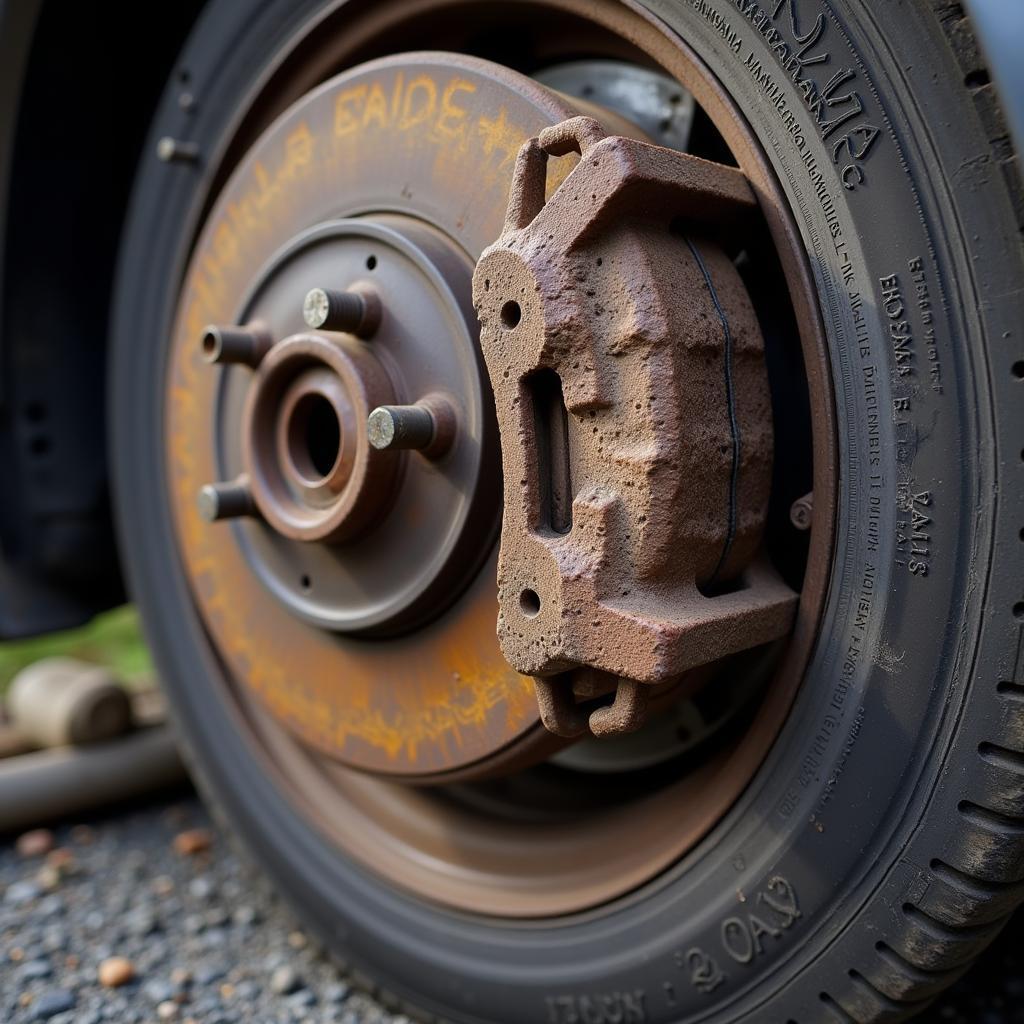Driving along and suddenly your brake warning light decides to flash on, then off again, then back on. Talk about nerve-wracking! An intermittent brake warning light can indicate a range of issues, from minor to serious. This guide will walk you through understanding what might be triggering that light and what steps you can take to get it resolved.
Common Causes of an Intermittently Illuminated Brake Warning Light
It’s important to remember that the brake warning light system is tied into multiple components of your vehicle’s braking system. Here’s a breakdown of the most common culprits:
- Low Brake Fluid Level: This is the most frequent reason for the brake warning light to illuminate. Brake fluid is the lifeblood of your braking system, transferring force from your foot on the pedal to the brake pads.
- How to check: Locate your brake fluid reservoir (refer to your owner’s manual for its location). The reservoir will have a “Min” and “Max” marking. If the fluid level is below the “Min” mark, it needs to be topped up.
- What to do: If the fluid is low, adding the correct type of brake fluid (DOT 3 or DOT 4, check your owner’s manual) may temporarily solve the issue. However, it’s crucial to determine where the fluid is going. A leak in the system could be the culprit, and that requires immediate professional attention.
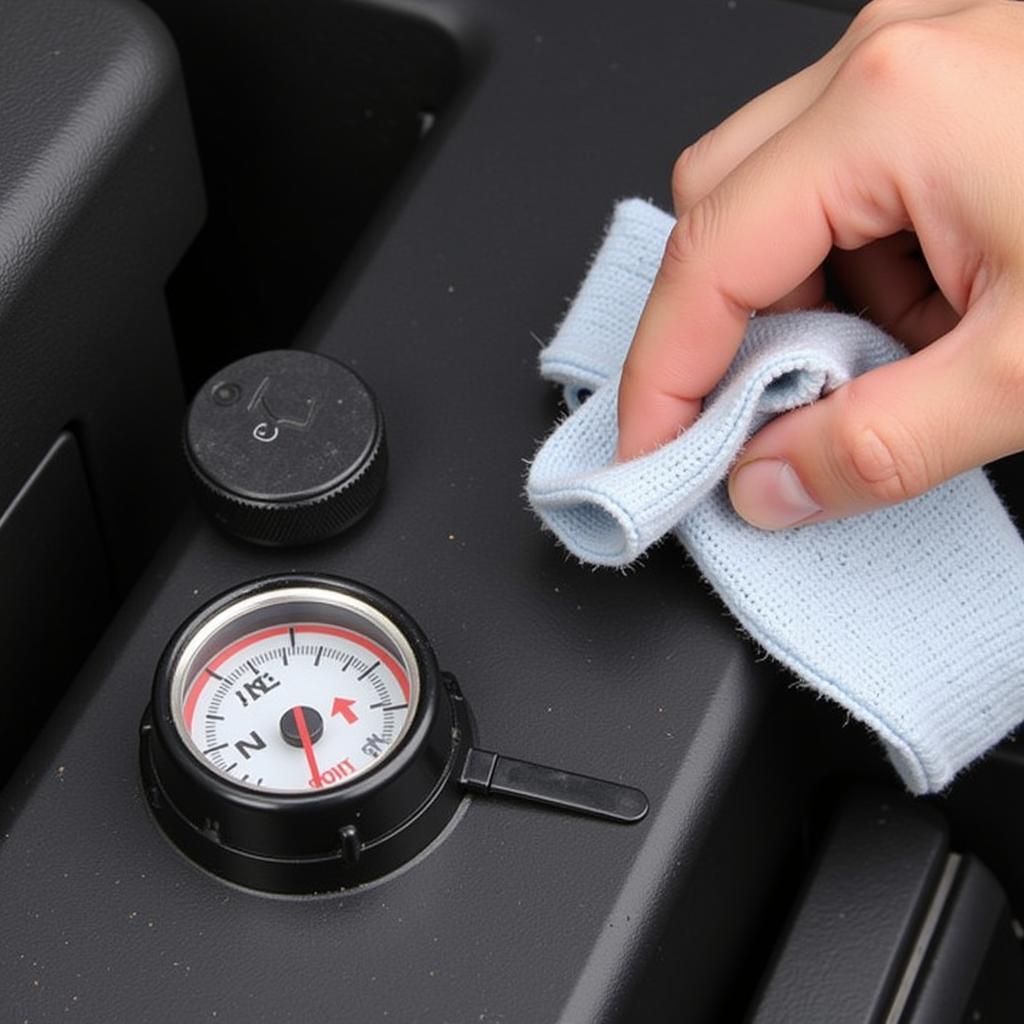 Checking Brake Fluid Level
Checking Brake Fluid Level
- Worn Brake Pads: Most modern cars have sensors in the brake pads that trigger the warning light when the pads wear down to a certain level.
- How to check: You can visually inspect the brake pads by looking through the spaces between the wheel spokes. If you see less than ¼ inch of brake pad material remaining, it’s time for a replacement.
- What to do: Don’t ignore this warning! Driving with worn brake pads significantly reduces your braking power and can lead to costly damage to your rotors. Schedule a brake pad replacement with a trusted mechanic.
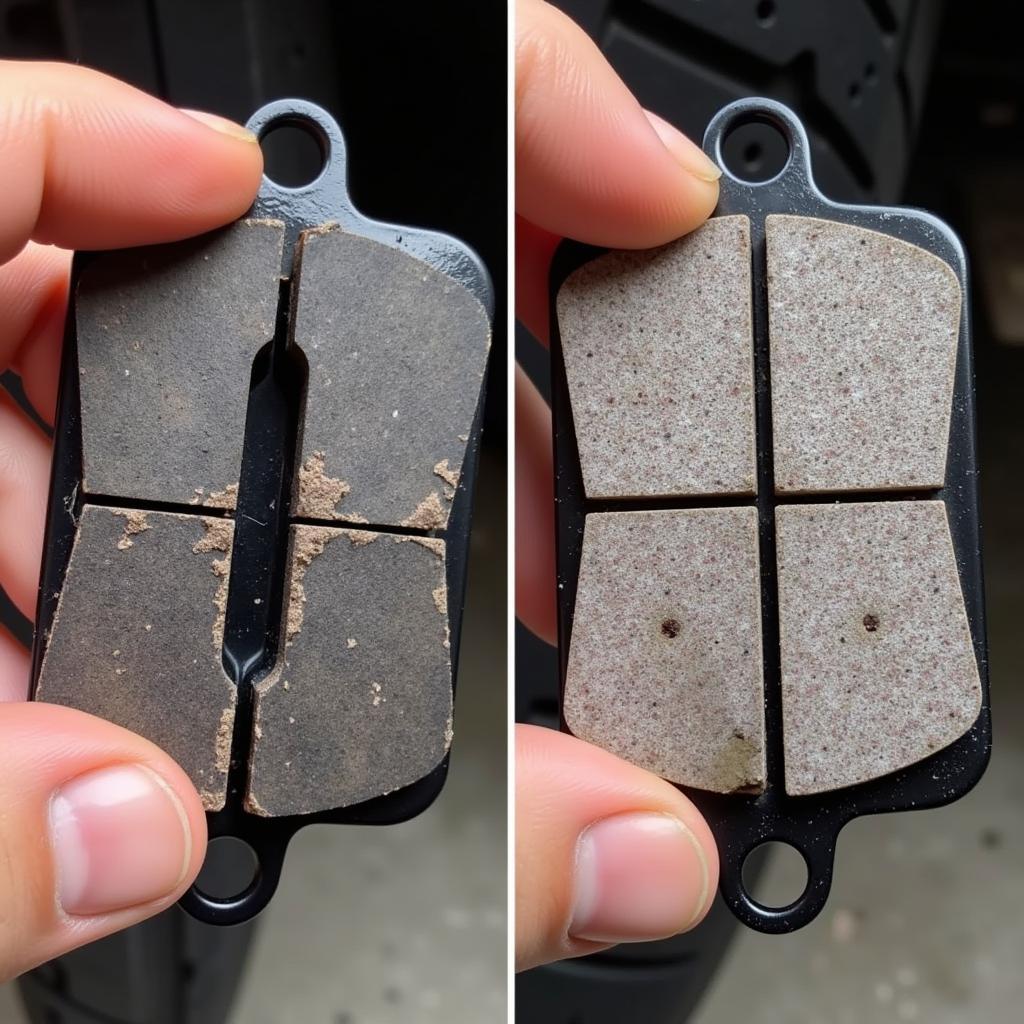 Worn Brake Pads
Worn Brake Pads
-
Faulty Brake Light Switch: The brake light switch is a small component that activates your brake lights when you press the pedal. It can also be responsible for illuminating the brake warning light.
- How to check: A faulty brake light switch might cause your brake lights to stay on constantly, or not illuminate at all. It may also prevent your vehicle from shifting out of “Park.”
- What to do: Diagnosing a faulty brake light switch often requires using a multimeter to test for continuity. If you’re not comfortable with electrical work, it’s best to have a mechanic diagnose and replace the switch.
-
ABS System Malfunction: Your Anti-lock Braking System (ABS) helps prevent your wheels from locking up during hard braking situations. If your ABS module or a wheel speed sensor experiences a problem, it can trigger the brake warning light.
- How to check: Often, when the ABS system malfunctions, a separate ABS warning light will illuminate on your dashboard along with the brake warning light.
- What to do: ABS system issues often require specialized diagnostic equipment. Take your vehicle to a qualified mechanic, preferably one with experience in ABS systems, to pinpoint the issue.
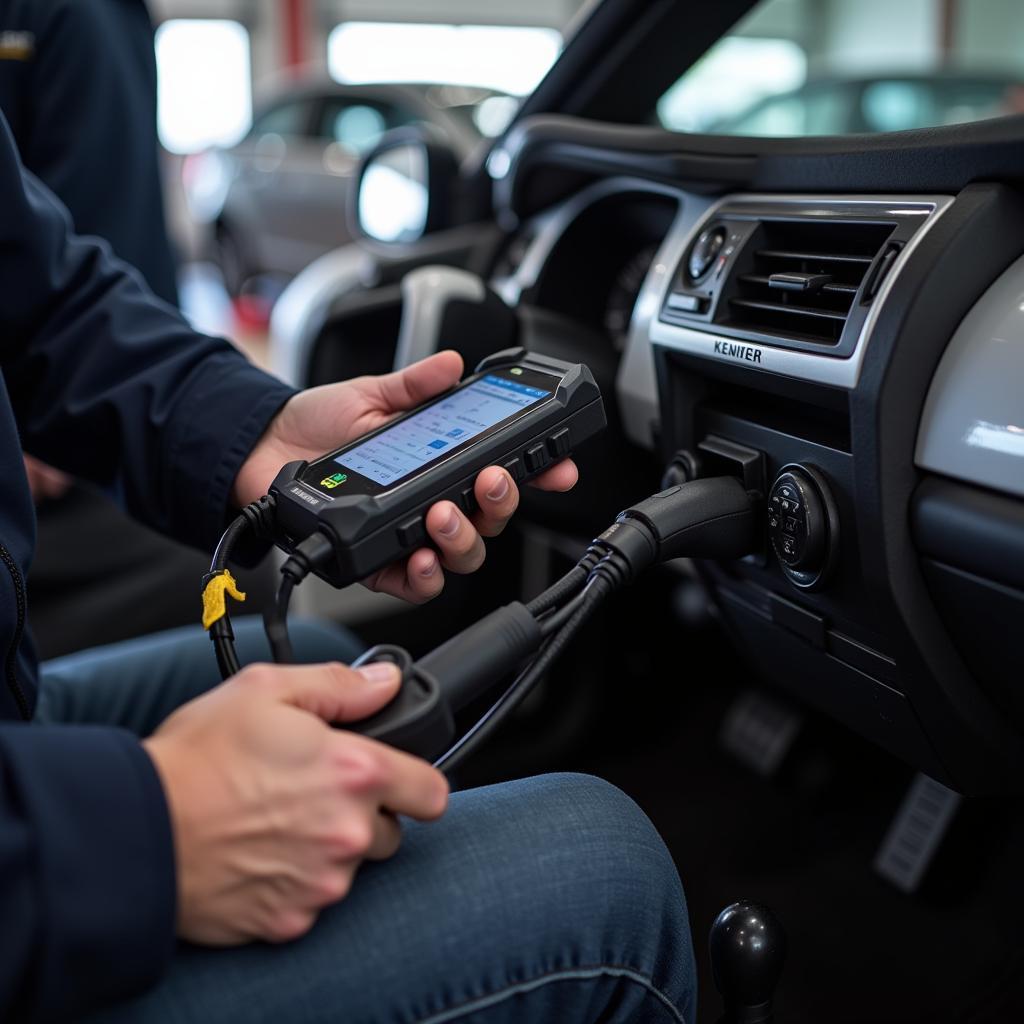 Mechanic Using a Diagnostic Scanner
Mechanic Using a Diagnostic Scanner
- Other Issues: While less common, issues like a failing parking brake, problems with the brake master cylinder, or even electrical faults can also cause intermittent brake warning light problems.
Why You Should Never Ignore an Intermittent Brake Warning Light
Even if the light isn’t on constantly, it’s signaling that something isn’t quite right with your braking system. Driving with any brake issues compromises your safety and that of other drivers.
Can I Drive With an Intermittent Brake Warning Light?
It’s strongly recommended that you avoid driving when your brake warning light is acting up, even intermittently. Have your car towed to a trusted mechanic or dealership for diagnosis and repair.
Tips for Preventing Brake Problems
- Regular Brake Inspections: Have your brakes inspected at least once a year, or more frequently if you drive in heavy traffic or hilly areas.
- Brake Fluid Flush: Follow your manufacturer’s recommended schedule for flushing and replacing your brake fluid.
- Quality Brake Pads: Invest in high-quality brake pads from reputable brands for optimal performance and longevity.
Getting Professional Help
As a specialist in remote automotive software diagnostics, programming, and installations, I’ve seen firsthand how complex modern braking systems have become. If your brake warning light is acting up, it’s vital to seek professional assistance promptly. Trying to diagnose and repair brake issues yourself can be dangerous if you lack the proper knowledge and tools. Don’t wait for a minor problem to become a major (and potentially very expensive) one.
FAQs
1. My brake warning light comes on when I hit a bump. What could that be?
This could indicate a loose connection somewhere in your brake system, such as a wiring harness or sensor connection. It’s essential to have this checked by a mechanic to ensure all connections are secure.
2. My brake warning light is on, but my brake fluid is full. What else could it be?
If your brake fluid is full, other potential culprits include worn brake pads, a faulty brake light switch, or a problem with your ABS system.
3. How much does it cost to fix a brake warning light issue?
The cost to repair a brake warning light problem can vary widely depending on the underlying cause. A simple brake fluid top-off might cost very little, while a brake pad replacement or ABS module repair can be significantly more expensive.
4. Can I use any type of brake fluid in my car?
No, using the incorrect type of brake fluid can damage your braking system. Always refer to your owner’s manual for the specified DOT (Department of Transportation) rating and type of brake fluid.
5. How often should I get my brakes checked?
It’s a good rule of thumb to have your brakes inspected at least once a year, or more frequently if you notice any signs of brake problems, such as squealing, grinding, or a pulsating brake pedal.
Remember, when it comes to your brakes, safety is paramount. If you experience any issues, don’t hesitate to seek professional help.

